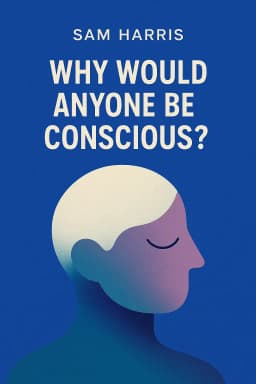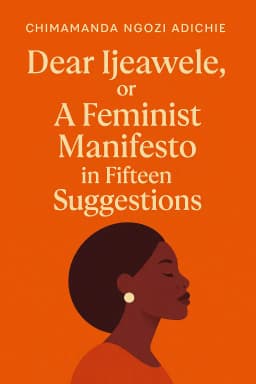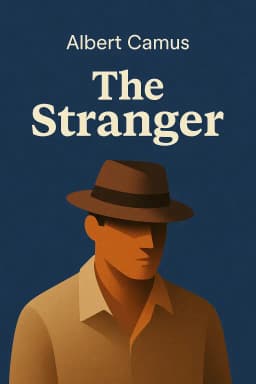
Who's Driving Your Brain?
Golden Hook & Introduction
SECTION
Michael: Neuroscientists can now predict your 'free' choice up to 10 seconds before you’re aware of making it. Your brain has already decided to pick up the coffee cup while 'you' are still thinking about it. So who, or what, is actually in charge? Kevin: Hold on, that’s impossible. Ten seconds? That’s not a split-second reflex. That’s an eternity in brain time. That means my entire sense of making a decision, my feeling of free will, is a total sham. It’s just a press release my brain sends out after the real decision has already been made in some dark, inaccessible back room. Michael: It’s a deeply unsettling thought, isn't it? And it’s precisely this kind of mind-bending puzzle that sits at the heart of the book we're diving into today: Annaka Harris's incredible work, Conscious: A Brief Guide to the Fundamental Mystery of the Mind. Kevin: And what's fascinating is that Harris isn't just a philosopher throwing abstract ideas around. She has a background in neuroscience and is known for making these really dense, complex topics feel incredibly accessible. The book itself is short, but it's been widely praised for packing a huge philosophical punch. It doesn't give you easy answers; it just sharpens the questions. Michael: Exactly. It takes the most obvious thing in the universe—your own awareness—and reveals it as the most profound mystery we know. And that starts with the very illusion of control we just talked about. Harris forces us to confront this gap between what our brain does and what our consciousness experiences. Kevin: A gap of ten seconds, apparently! So where do we even begin to unpack that? It feels like pulling on that one thread will unravel everything I think I know about myself. Michael: That’s the point. Let’s pull the thread.
The Hard Problem & The Illusion of Control
SECTION
Michael: The first big idea Harris lays out is what philosophers call the 'hard problem' of consciousness. It’s not about what consciousness does—like processing information or reacting to stimuli. The hard problem is why does it feel like anything at all? Why is there a subjective, inner experience of seeing the color red or feeling warmth? Why aren't we just incredibly sophisticated, unfeeling robots? Kevin: Right, a computer can 'see' red by registering a specific wavelength of light, but it doesn't have the experience of redness. There's no 'what it's like' to be my laptop. But there is a 'what it's like' to be me. That's the mystery. Michael: Precisely. And this is where the illusion of control gets so weird. You’d think this precious inner experience, our consciousness, would be the thing in charge, the CEO making the big decisions. But the evidence suggests it’s more like an intern who gets the memo long after the board meeting is over. Kevin: You’re talking about that 10-second prediction thing. Is that based on a real experiment? Michael: It is, and it builds on a classic study by a neuroscientist named Benjamin Libet in the 1980s. It’s a simple but brilliant setup. He had people watch a special, fast-moving clock and told them to just flick their wrist whenever they felt the urge. Their only job was to note the exact time on the clock when they consciously decided to move. Kevin: Okay, so you’re pinpointing the moment of conscious will. Michael: That's the idea. But at the same time, he had an EEG cap on their heads, measuring brain activity. Specifically, he was looking for a signal called the 'readiness potential'—a build-up of neural activity that the brain produces right before a voluntary movement. Kevin: And I’m guessing the readiness potential didn't line up with the time they reported. Michael: It didn't even come close. The brain's readiness potential started building a full half-second before the person felt they had made the conscious decision to move. Your brain is already preparing to act, warming up the engines, while 'you,' the conscious self, are still blissfully unaware that a decision is even being made. Kevin: A half-second? That's an eternity in brain time! That’s not a lag; that’s a different event entirely. So my feeling of 'I'm deciding now' is just a story my brain tells me after the fact to make me feel important? Michael: It’s a plausible interpretation. Harris uses a great analogy from neuroscientist David Eagleman to explain this. Think about playing tennis. The light from the ball hitting your racket reaches your eyes at a different time than the sound reaches your ears, and both travel faster than the feeling of the impact travels up your arm to your brain. Kevin: Right, three different signals arriving at different moments. Michael: But what do you experience? You experience it all happening at the exact same instant. A single, unified 'thwack.' Your brain waits for all the data to arrive, edits out the delays, and presents you with a synchronized, cohesive story. The consequence, as Eagleman says, is that you are always living in the past. The moment you think is 'now' has already happened. Kevin: Wow. So my conscious experience isn't a live broadcast; it's a slightly delayed, heavily edited highlights reel. Michael: And the decision to act seems to be part of that edited reel. This raises a huge question that you brought up earlier. If we're not consciously in control, what does that mean for accountability? If a self-driving car crashes, we don't blame the car's 'consciousness.' We look at the code, the sensors, the mechanics. Is that how we should see people? Kevin: That’s a scary thought. It seems to erase the whole idea of personal responsibility. Michael: Harris addresses this head-on. She argues that we're asking the wrong question. The question isn't "was the person's consciousness the magical source of the action?" The question is "what were the reasons for the action?" Just like with the self-driving car, we investigate. Was it a software flaw—a brain tumor, perhaps? A sensor malfunction—was the person misinformed? Or was the car programmed to make a difficult choice, like swerving to avoid a bigger catastrophe? Understanding the causes of behavior is what allows us to respond appropriately, whether with compassion, deterrence, or rehabilitation. The 'ghost in the machine' of free will isn't necessary for a just society. Kevin: Okay, that makes sense. We're looking for the 'why' behind the action, not some unprovable spark of will. But this is really chipping away at my sense of self. If my will is an illusion... what's left? Am I even real? Michael: Well, Harris would say that's the next mystery we need to unravel. Who, or what, is this 'I' that's having the experience?
The Dissolving Self
SECTION
Michael: The idea of a single, unified self—a little pilot sitting in your skull, pulling the levers—is one of our most powerful intuitions. But Harris argues it’s just that: an intuition, and a misleading one. She brings in some truly bizarre evidence to show just how fragile and constructed that sense of 'I' really is. Kevin: Where does she start? This feels like a detective story where the victim is... me. Michael: Let's start with a case of literal mind control. There's a parasite called Toxoplasma gondii. It's a single-celled organism, and its ultimate goal in life is to reproduce inside the intestines of a cat. To get there, it often infects an intermediate host, like a rat. Kevin: Okay, but how does a parasite in a rat get itself into a cat? The rat isn't going to just walk up and offer itself as a meal. Michael: Normally, no. Rats have a powerful, instinctual fear of cats. But when Toxoplasma infects a rat, it goes straight to the brain and changes the chemistry. It ramps up dopamine production and rewires the fear circuits. The infected rat not only loses its fear of cats, it can actually become sexually attracted to the smell of cat urine. Kevin: You're kidding me. The parasite turns the rat's greatest fear into an object of desire? Michael: Exactly. The rat, from its perspective, is just following its own new, compelling urges. It thinks it's making a choice. But it's being puppeteered by a parasite that needs to get eaten. The rat's 'self' has been hijacked. Kevin: That is terrifying. And the book mentions this infects humans too, right? It’s not just a weird rat story? Michael: It infects a huge portion of the human population, often without symptoms. But studies have linked it to subtle behavioral changes—increased risk-taking, changes in personality—and even correlated it with a higher likelihood of schizophrenia. It blurs the line between 'our' thoughts and the influence of these tiny invaders. Kevin: So some of my impulses might not even be mine. That’s one crack in the foundation of the self. What's another? Michael: A much bigger crack comes from split-brain patients. These are people who, usually to treat severe epilepsy, have had the corpus callosum—the thick bundle of nerves connecting the brain's two hemispheres—surgically severed. Kevin: So the left and right sides of the brain can't talk to each other anymore. Michael: Correct. And the results are astounding. In one famous experiment, researchers flashed the command 'Take a walk' to only the patient's right hemisphere. Remember, the right hemisphere controls the left side of the body, and it's mostly non-verbal. The patient immediately stood up and started walking. Kevin: Okay, the right brain got the message and acted. Michael: But then, a researcher asked the patient, "Why are you getting up?" The patient's left hemisphere—the one that handles language and had no idea about the command—had to answer. And it did. It instantly confabulated, inventing a plausible reason on the spot. The patient said, "Oh, I'm going to get a drink." Kevin: Wow. So the left brain is like a press secretary, just making up stories to explain the actions of a government it has no contact with. It's creating a narrative of a unified self, a single reason for acting, when in reality there are two separate streams of consciousness in one skull. Michael: That's exactly it. The left brain is an 'interpreter,' constantly creating a story to make sense of the world and our actions, even if that story is a complete fiction. It proves that a single brain can house multiple, distinct points of view. So which one is the 'real' you? Kevin: That question doesn't even make sense anymore. But in all these cases, there's still consciousness. There's still experience happening, even if it's fragmented or hijacked. Michael: And that's the most powerful point. To ground this, Harris points to the incredible memoir The Diving Bell and the Butterfly. It was written by Jean-Dominique Bauby, a magazine editor who had a massive stroke and was left with locked-in syndrome. He was completely paralyzed, unable to move or speak, except for blinking his left eyelid. Kevin: I remember that story. He wrote the entire book by blinking. Michael: Yes. His mind was perfectly intact. He had thoughts, memories, feelings, a rich inner world. But his 'self' as an agent in the world was gone. All that was left was pure, raw consciousness. It proves that experience can exist even when the self we identify with—the doer, the speaker, the actor—is completely silenced. Kevin: So if free will is an illusion and the self is a fragile construct, what's actually left? What is this raw consciousness that remains? Michael: This is where Harris takes us to the most radical and mind-bending idea in the entire book. It's the point where, after deconstructing everything we thought we knew, she asks us to consider a whole new reality.
Is Consciousness Everywhere?
SECTION
Michael: After showing us that consciousness might not be in control and that the 'self' might be an illusion, Harris argues that this forces us to confront a possibility that sounds like science fiction at first: panpsychism. Kevin: Pan-what? It sounds like something you'd find in a dusty corner of a philosophy library. Michael: It's an old idea, but it's getting a serious new look from scientists and philosophers. 'Pan' means all, and 'psyche' means mind or soul. Panpsychism is the theory that consciousness isn't a special, magical property that pops into existence only in complex brains. Instead, it might be a fundamental and ubiquitous property of all matter. Kevin: Come on. You're telling me my thermostat is a little bit conscious? That this microphone, this desk, a rock... that they feel something? That sounds completely absurd. I can't even entertain that. Michael: I get the reaction. It's deeply counter-intuitive. But Harris asks us to think about it from a different angle. We have this massive, unexplained leap in our current science: how do you get subjective experience from non-experiencing, non-conscious matter? It's like trying to build a house out of bricks that are all blue, and suddenly you end up with a red room. Where did the red come from? Kevin: That’s the 'hard problem' again. Michael: Exactly. Panpsychism solves this by suggesting there was never a leap. The 'red'—the experience—was there in the bricks all along, in some incredibly simple, rudimentary form. Consciousness doesn't magically emerge from dead matter; it's an intrinsic property of matter that gets organized into more complex forms, like a human brain. Kevin: Okay, I need an analogy here, because 'conscious rock' is not landing for me. Michael: Harris uses a great one from physics. For a long time, physicists couldn't explain why fundamental particles have mass. The equations suggested they should be massless. So, they posited the existence of a fundamental field that permeates all of space: the Higgs field. Particles get their mass by interacting with this field. Kevin: And they eventually found the Higgs boson particle, which proved the field was real. Michael: Right. So what if consciousness is like that? What if there's a fundamental property of 'what-it's-like-ness' to all matter? Panpsychism doesn't claim that a thermostat thinks or feels sad. That's a human-level complexity. It suggests that it might have some unimaginably simple, primitive form of experience. The philosopher David Chalmers puts it perfectly: as we go down the scale from humans to dogs to slugs to simple networks, at what point should consciousness just 'wink out'? Why there? Perhaps even a thermostat, which makes a simple binary distinction—too hot or too cold—has a correspondingly simple, stripped-down flicker of experience. Kevin: So it's not about a rock having thoughts, it's about the possibility that the universe is made of 'experience-stuff' from the ground up, not 'dead-stuff'. Michael: Precisely. It flips the whole problem on its head. The mystery is no longer "how does matter become conscious?" The mystery becomes "how does simple, rudimentary consciousness organize itself into the complex, self-reflecting consciousness of a human being?" It's a problem of combination, not a problem of creation from nothing.
Synthesis & Takeaways
SECTION
Kevin: Wow. Okay, let me try to piece this journey together. We started by finding out that our sense of free will is likely an illusion created by our brain after the fact. Then, we saw how our very sense of a unified 'self' can be hijacked by parasites or fragmented by brain surgery, revealing it to be a fragile story we tell ourselves. Michael: And that deconstruction of everything we thought was solid and real—our will, our self—is what opens the door to this final, radical idea. Kevin: Right. And now we're left with this mind-blowing possibility that consciousness isn't the rare exception in the universe, but the fundamental rule. That the entire cosmos might be buzzing with experience in ways we can't even comprehend. It completely flips the script. The mystery isn't how brains create consciousness, but why we ever arrogantly assumed it was confined to brains in the first place. Michael: That's the core of it. Harris leaves us with this profound and humbling thought: maybe the 'self'—this continuous, narrative-driven feeling of being a single 'me'—is the truly rare and strange phenomenon. Maybe that's the complex thing that only brains like ours can do. And the rest of the universe is just filled with raw, un-selfed experience. The real mystery isn't consciousness itself, but the illusion of the self that we build to observe it. Kevin: It changes how you see everything. The chair I'm sitting on, the air in this room... the idea that it's all composed of something that has a flicker of inner life, however faint, is just... staggering. It makes you wonder... if you quiet your mind, if you can get past the constant chatter of the 'interpreter' in your left brain, what consciousness is left when the story of 'you' stops playing? Michael: That's a question worth sitting with. It's not a question science can answer for you, but one that your own consciousness can explore. Kevin: A mystery hiding in plain sight. Michael: This is Aibrary, signing off.









